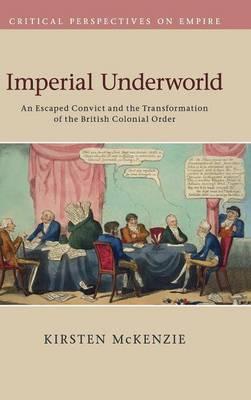In this blog entry, Professor Kirsten McKenzie reflects on the utility of studying historic scandals. Her thoughts are drawn from the presentation she gave at a plenary session on Historical Curiosity at the recent History Postgrad Conference, “The Past and the Curious” in November 2017.

Historical Curiosity
I’ve taken inspiration from the theme of this conference in two ways – firstly, what use can we make of curious incidents in the past? And, secondly, how do we deal with our own curiosity about them?
I’m still not entirely sure whether this is by accident or design but I’ve come to realise that much of what I research can be classed as ‘curious’. I don’t mean in the sense that the past is another country, and what might seem odd to us was not so previously. These are events and personalities who were considered downright weird at the time. My two most recent books are both about convict impostors in the first half of the nineteenth century, although their impersonations were undertaken with very different motivations and effects.
One, the improbably named John Dow, was a con artist seeking gain through identity theft. The other, who began his life as Alexander Kaye and ended it as William Edwards, was an escapee trying to hide under a false name. Both got caught. Neither would admit their guilt. In the case of Edwards the mystery persisted even after the prisoner took his own life. These cases excited much curiosity and debate in their own time, even if they were largely forgotten afterwards. When remembered, they were never considered the proper subjects of serious history.
By their very nature, Dow and Edwards were serial liars. Their actions confounded observers at the time, several of whom described them as insane. Much of their story remains unknowable. This brings me to my second point – what do we do, as historians, with our curiosity about the past. How should we direct that curiosity?
When I was sitting where you are now – and in the last year of my PhD – I gave a presentation at a large international conference where the papers were pre-circulated and where Ann Stoler was the keynote speaker. For those not in my field, Ann Stoler is one of the big names in imperial history, and was already an academic superstar in the late 1990s. So, you can imagine how I felt when mine was the paper she singled out for praise and discussion as part of her keynote address.
When I had found the material on which the paper was based, I knew it was a huge coup – I was writing a thesis about questions of gender and honour and I had found a cache of papers about alleged incest and concealed pregnancy involving the Chief Justice of the Cape Colony, Sir John Wylde, and his daughter Jane. The day I came upon the papers saw me quite literally shouting aloud with joy in the car all the way home from the archive. Which seems a bit sick when you consider the contents of the material itself.
But this wasn’t why Stoler singled out my paper for praise – she admired what she called (and I can still remember the gist 20 years later) my ‘postmodern determination’ not to become caught up in the solution to the story, but rather to leave the mystery unresolved. Instead of putting what had happened to Jane Elizabeth at the center of my analysis – was she the victim of rape or incest? had she killed her own child? had she had a lover whom it was somehow impossible to acknowledge? – I had focused in the paper on the wider significance of the scandal for understanding Cape colonial society – how it related to debates over slave emancipation, the press, and the nature of gendered discourse in public and private.
My immediate thought when I heard Stoler’s comment on my paper was – ‘well, I’m glad this great scholar thinks I have postmodern determination, I better start pretending I’ve GOT postmodern determination because the reality is that if I could have solved the mystery from the sources available I would gleefully have done so.’
I mention this as a foundation story in my career not only because it pointed the way to the historian I would become – one who specialised in scandal – but also because it took the process of writing several books to work through quite how incisive Stoler’s comment was to how we should approach the phenomenon of scandal. Indeed, she likely didn’t realise herself the significance of what in retrospect was probably just an off-hand remark.
If historians want to understand the kind of everyday attitudes that are the focus of cultural history, why work on scandals? They are surely unusual events by definition? But, of course, some people are scandalous, only if others are not. So, they allow us to see where the lines of acceptable and unacceptable behaviour are drawn and constantly renegotiated.
Secondly, they generate extensive sources and articulate what are often unspoken assumptions about proper behaviour. Scandals can also have important effects in bringing about social change – they can involve the rise and fall of public figures, they can have concrete political effects by bringing unacceptable behaviour under public scrutiny. They can be used by the powerless to shame and expose the powerful. They can be used as political traction to bring about desired outcomes, often only peripherally related to the original scandal itself. All of this is inherently unstable and unpredictable – scandals are extremely difficult to manipulate. They often start out as being about one thing or person and end up being about something quite different. The scandal of John Wylde and his daughter is a textbook example of this.
For all these advantages, the historian of scandal must be prepared to have her curiosity frustrated. She must always face the prospect of suffering what the novelist A.S. Byatt calls ‘narrative greed’ – and of accepting that this greed will not be satisfied. This is not to say that narrative is a bad thing – but it isn’t the only thing. There is always the search for the good story when writing about scandal, the satisfaction of finding out ‘what happened’, of marshalling all the twists and turns of plots and sub-plots.
It is notable how often historians of scandal use the language of plots, or of drama when they are setting the scene. We need to be honest about the narrative pleasures of this sensationalism. There are very good reasons why we might want to know what happened. But as I tell my students in the unit ‘Sex and Scandal’, some really bad history – often for general audiences – can be written about scandals in the name of telling stories. This risks not only being bad quality, but having bad effects, simply interested in the prurient details, details that are taken for granted and sensationalized, with no attempt to understand what it all means.
It is worth mentioning that I found the Wylde material (marked as “under restricted access”) with the help of a very experienced archivist – and he said quite explicitly that he had only brought it to my attention because he knew my scholarship and he was satisfied that I would deal with it responsibly. (I’m glad he didn’t see me shouting in the car on the way home.) Our curiosity is natural, and important in getting things right, but it is important not to become caught up in a historian-as-detective approach when dealing with scandal. This is not CSI Archive. Sometimes the best solution is to set aside one’s natural curiosity to discover a secret – or to become curious about something else.
Let me end with an example of this from my most recent book. One of the most challenging parts of writing Imperial Underworld was addressing an incident in the life of William Edwards that has been written about numerous times – but never in a scholarly way. This involved a notorious scandal that was intensively investigated at the time – without a satisfactory solution. An anonymous placard was posted on the streets of Cape Town accusing the Governor, Lord Charles Somerset, of “buggering Doctor Barry”. No copy survives. Various accounts of its wording exist. There were even doubts expressed as to whether it had ever really existed, for only one person admitted to having seen it before it disappeared.
William Edwards was the chief suspect, but nothing was ever proved against him. The incident has sparked intensive curiosity amongst popular historians, particularly those writing about Barry, whose sex remains a subject of debate. Serious scholars, however, have shied away from the incident – unable to find an analytical purpose for it, even though it took place in the midst of an intensively studied period of Cape history.
What should spark our curiosity about the placard affair – what questions should we be asking about it as historians? ‘Narrative greed’ leads us to two obvious ones – were Somerset and Barry engaged in sexual relations? And, who put up the placard? The answer to the first question has eluded countless biographers of both Barry and Somerset. For what it is worth, a recent book on Barry has uncovered some persuasive evidence that the doctor was born female though that leaves us no further ahead on the question of relations with Somerset. And with regard to the second question – \who put up the placard – the historian has access to only the same evidence, admittedly voluminous, that was collected in the original case. Can she expect to succeed where a determined public prosecutor under intense political pressure failed some 200 years earlier?
I didn’t consciously think of Ann Stoler’s comment while I wrestled with how to write about the placard scandal in a useful way. Nevertheless, her response to that paper on the Wyldes some 20 years ago doubtless had a role in helping me to work out how I approached this problem. For my purposes, the scandal’s utility lies precisely in recognising its tenuous hold on reality – using that as the object of my analysis rather than an obstacle to my analysis – and in tracing the tactics of ideological warfare that broke out in its aftermath.
As a way of understanding the processes of imperial reform debates, my interest was more in the political management of the scandal than in the alleged sexual improprieties of Lord Charles Somerset and Dr James Barry or the identity of the persons who claimed to have brought them to light. If we look carefully at the sources we can see what was very clear to contemporaries but what historians have missed. What was most significant about the incident was not the contents of the placard itself but the “political ends” – in the words of contemporaries – to which its existence could be put. Despite the dangerous accusations allegedly made in the text (remember our evidence that the placard even existed is tenuous) sex drops out of the public discussion remarkably quickly. What ensues is effectively a public relations struggle between Somerset and his political opponents in both Britain and the Cape, a debate that revolved not around his sexual misconduct but around his tactics of information gathering and the use of spies. Historians can and often should use scandals to ask and answer different questions from the ones that preoccupied those living through them. Because after all, what we are most curious about is working out methods to understand the past as best we can.

